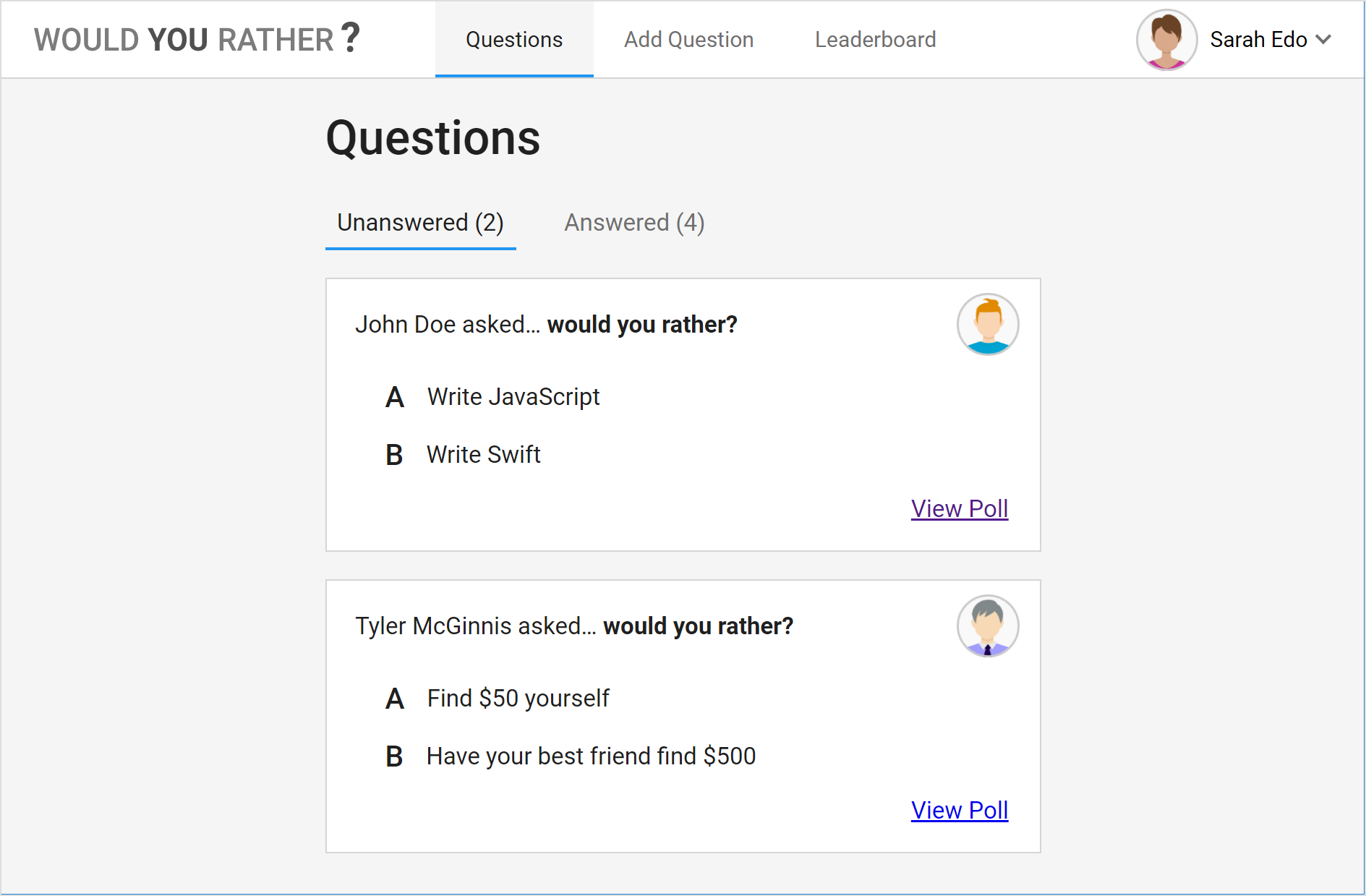Jon Keeping's solution for the Would You Rather Project. The Would You Rather website allows you to ask and answer questions from one of two choices.
To run the site, perform the following steps:
- Install all project dependencies with
npm install - Start the development server with
npm start - Access the site locally on http://localhost:3000
There are two types of objects stored in our database:
- Users
- Questions
Users include:
| Attribute | Type | Description |
|---|---|---|
| id | String | The user’s unique identifier |
| name | String | The user’s first name and last name |
| avatarURL | String | The path to the image file |
| questions | Array | A list of ids of the polling questions this user created |
| answers | Object | The object's keys are the ids of each question this user answered. The value of each key is the answer the user selected. It can be either 'optionOne' or 'optionTwo' since each question has two options. |
Questions include:
| Attribute | Type | Description |
|---|---|---|
| id | String | The question’s unique identifier |
| author | String | The author’s unique identifier |
| timestamp | String | The time when the question was created |
| optionOne | Object | The first voting option |
| optionTwo | Object | The second voting option |
Voting options are attached to questions. They include:
| Attribute | Type | Description |
|---|---|---|
| votes | Array | A list that contains the id of each user who voted for that option |
| text | String | The text of the option |
Your code will talk to the database via 4 methods:
_getUsers()_getQuestions()_saveQuestion(question)_saveQuestionAnswer(object)
_getUsers()Method
Description: Get all of the existing users from the database.
Return Value: Object where the key is the user’s id and the value is the user object.
_getQuestions()Method
Description: Get all of the existing questions from the database.
Return Value: Object where the key is the question’s id and the value is the question object.
_saveQuestion(question)Method
Description: Save the polling question in the database.
Parameters: Object that includes the following properties: author, optionOneText, and optionTwoText. More details about these properties:
| Attribute | Type | Description |
|---|---|---|
| author | String | The id of the user who posted the question |
| optionOneText | String | The text of the first option |
| optionTwoText | String | The text of the second option |
Return Value: An object that has the following properties: id, author, optionOne, optionTwo, timestamp. More details about these properties:
| Attribute | Type | Description |
|---|---|---|
| id | String | The id of the question that was posted |
| author | String | The id of the user who posted the question |
| optionOne | Object | The object has a text property and a votes property, which stores an array of the ids of the users who voted for that option |
| optionTwo | Object | The object has a text property and a votes property, which stores an array of the ids of the users who voted for that option |
| timestamp | String | The time when the question was created |
_saveQuestionAnswer(object)Method
Description: Save the answer to a particular polling question in the database.
Parameters: Object that contains the following properties: authedUser, qid, and answer. More details about these properties:
| Attribute | Type | Description |
|---|---|---|
| authedUser | String | The id of the user who answered the question |
| qid | String | The id of the question that was answered |
| answer | String | The option the user selected. The value should be either "optionOne" or "optionTwo" |
In the project directory, you can run:
Runs the app in the development mode.
Open http://localhost:3000 to view it in the browser.
The page will reload if you make edits.
You will also see any lint errors in the console.
Launches the test runner in the interactive watch mode.
See the section about running tests for more information.
Builds the app for production to the build folder.
It correctly bundles React in production mode and optimizes the build for the best performance.
The build is minified and the filenames include the hashes.
Your app is ready to be deployed!
See the section about deployment for more information.
